Über den Einfluss familiärer Erwartungen, das innere Kind und Dinge, die einfach raus müssen – Yael Naim im Klangverführer-Interview
Am Freitag erscheint das neue Album She Was A Boy von Yael Naim endlich auch bei uns. Bis jetzt war es ausschließlich in Frankreich zu haben. Für mich fällt die Veröffentlichung mit meinem 3-jährigen Jubiläum bei fairaudio zusammen. Klar, dass dort auch bald wieder die Besprechung der Platte zu finden sein wird. Schließlich hat mir bereits das 2007er-Album der israelisch-französischen Sängerin/Songwriterin Glück gebracht.
Vor ziemlich genau drei Jahren hatte ich, desillusioniert von meinem damaligen Job, einen Tag freigenommen, um mit dem Status quo zu hadern und über die Zukunft nachzudenken. Damals wohnte ich in der Nähe einer Mensa, in der ich manchmal zu Mittag aß. So auch an diesem schicksalsträchtigen 4. April. Nach dem Mittag checkte ich gewohnheitshalber das schwarze Brett der Uni – und da war es: Musikkritiker gesucht. Ich meine, wann wird denn schon einmal ein Musikkritiker gesucht? So schnell mich meine Beine tragen konnten, lief ich also ins angrenzende Computerzentrum auf dem Campus und schickte dem suchenden Redakteur einige Links zu Artikeln, die ich geschrieben hatte. Man einigte sich auf einen Testartikel – die Rezension des nämlichen Albums –, und obwohl ich ihn heute bestimmt anders schreiben würde (er ist sehr musiktheorielastig, operiert mit Begriffen wie „a-Moll-Vorhalt zur Dominante“ – damals dachte ich, man erwarte so etwas von mir), wurde ich als Hauskritiker bei fairaudio.de eingestellt. Grund genug, die glücksbringende Künstlerin persönlich zu treffen.
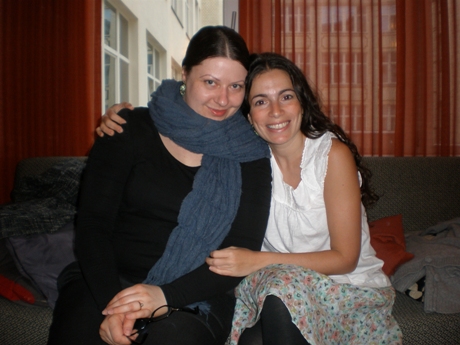
Erkältung trifft Nachthemd, Wollschal nackte Haut
Wir haben Ende März und es ist einer dieser Tage, an denen alles schief geht. Es fängt damit an, dass ich aus einer bleiernen Müdigkeit heraus den Wecker überschlafe. Das passiert mir in etwa alle drei Jahre einmal, aber wenn, dann generell am Tag eines wichtigen Termins. Nicht etwa sonntags oder so. Nachdem ich hektisch aus dem Bett gesprungen bin und in Rekordzeit das Bad hinter mich gebracht habe, findet mein potenzielles Frühstücksei seinen Weg nicht in den Topf, sondern landet stattdessen auf dem Küchenfußboden. Glibberige Roheimasse aus den Dielenritzen kratzen ist natürlich genau das, was man an einem Morgen in Zeitnot noch braucht – auch wenn ich im Allgemeinen ein sehr geübter Dielenritzenauskratzer bin, denn schließlich ist Kopfhörerhund ein mindestens ebenso geübter kleiner Kotzer. Okay, ein ziemlich großer Kotzer. Aber das nur am Rande. Kopfhörerhund hatte ich sicherheitshalber über Nacht in seinem Tagesrudel untergebracht, damit zumindest er nicht Schuld an unvorhergesehenen morgendlichen Verzögerungen ist. Wie man sieht, kriege ich die ja auch allein hin! Als ich mich jedenfalls zum verabredeten Hotel aufmache, ist es draußen zu allem Überfluss grau und regnerisch, die Gegend nicht wirklich einladend.
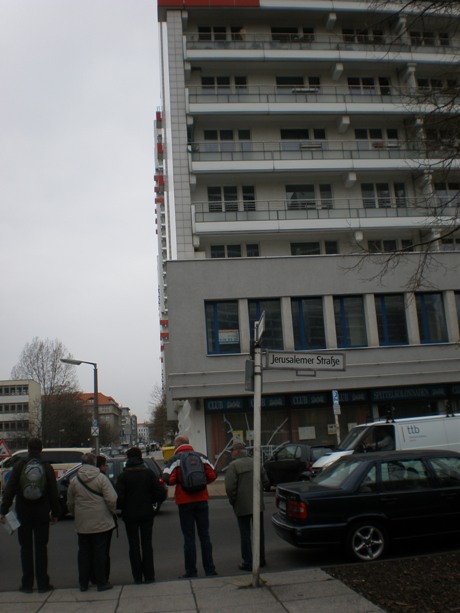
Musikbusinesslogik: Wer aus Israel kommt, wird in der Jerusalemer Straße untergebracht.
Der Anblick einer übernächtigten Yael Naim, ungeschminkt, mit noch duschnassem Haar und einer Mischung aus Nachthemd und Hausherumschlontzanzug angetan (Rüschennachthemd zu Leggins zu Strickjacke) lässt aber sofort ein heimeliges Solidaritätsgefühl aufkommen. Sie und ihre Tourmanagerin Aurelie Sauffier haben auch keinen guten Tag erwischt. Einer von Naims Koffern ist unterwegs verlorengegangen, das letzte Mal wurde er in Orly gesichtet („I don’t mind if they forget it. But this time, they don’t even know where it is!“) . Zu allem Überfluss befand sich nicht nur die Kleidung Naims, sondern auch der Laptop von Sauffier darin – ein Desaster, welches ich sehr gut nachvollziehen kann. Auf dem Rückflug von Buenos Aires nach Berlin ist auch mein Gepäck kurzzeitig verlorengegangen: Antiquarische Noten und Bücher, Kopien aus Archiven und Bibliotheken, kurz: das Forschungsmaterial eines Herbstes – alles weg! Und der ungerührte Schalterbeamte konnte das Ausmaß der Katastrophe nicht angemessen würdigen, wie ich fand, dafür aber fand er etwas: nämlich meinen Koffer in Heathrow. Der wurde mir noch am selben Tag nach Hause geliefert; und mit dieser Story versuche ich Yael Naim und Aurelie Sauffier Mut zuzusprechen. Einen Vorteil hat der Verlust allerdings: Die Damen müssen nun wohl oder übel shoppen gehen. Nicht, dass sie Kleider mögen würden, nicht, dass sie Geld ausgeben wollten – aber ach, die Umstände zwingen sie eben zum Shoppen! Tragisch … Vor der Bekleidungsersatzbeschaffung kann ich aber noch ein paar Fragen stellen.
Israeli singer/songwriter Yael Naim on unconscious family codes & expectations, the inner child and things that just have to be let out
Klangverführer: Your new album’s pre-release single is called Come Home, a light airy song with a catchy melody, but also very meaningful lyrics. Does the title hint at a personal home coming, either musically speaking or physically with your return from Israel to your birth place Paris?
Yael Naim: There are some songs that speak about some more abstract experiences; some speak about more concrete … reality. This particular song speaks about a concrete reality, something I’ve been living through with my family. When I left Israel to Paris they used to tell me „come home“. But „come home“ here is not only physical, it’s also sometimes the fact that … when you grow up and live your own life, you maybe don’t take everything you’ve been taught, you develop your own opinion about things, you do different choices than you’ve been expected to … and then, again, the family or the community or whoever tells you „come back to what we gave you“ and you say, „yes, but I want to go from here and not from there“, so it’s a period, when you can fight or have a drama in the family … and at the end it was kind of resolved because at one point in the end of the song and in my life I felt suddenly that I can understand them: when you give to a child everything that you think is the best and it’s going some other way you start to panic in the beginning … so that’s what it’s about.
About the family that says „Come home to my expectations“ …
… yes. Yes.
Alright, I see. If we compare your new album to your predecessor album from 2007, I experience She Was A Boy as a bit more somber, more going in-depth – for example on My Dreams, but at the same time as stylistically more versatile. For example, we have this kind of Reggae beat on Go To The River and Mystical Love, we get a Southern or even Country feeling on Never Change and with Man of Another Woman there’s an almost classical oriental piece … Where do you yourself see the differences between your album from 2007 and your new album, musically speaking?
First it’s different, period, because it brings a different way of writing. The first album … it was kind of very strange … because I always wrote in English and a few of the songs in the new album are very old. And the first album, it was like … there were some events in my life that effected me very strongly, like my boyfriend left me and noting worked as I wanted to and as I thought it would, so I was kind of noticing that I cannot control everything and that I am not as experienced in life as I thought I was, so I just did pause from everything. I didn’t have no job, nothing to live from and no one to live with. And in this period I started to write in Hebrew for the very first time – I think because I was far from home. It was the first time to write in Hebrew and almost the first time to write a complete … like many songs in the same short period. Usually, I write all the time and it’s not something that goes at a single blow! It was a very intense period with the same emotion and ten songs in Hebrew with the guitar came out – usually I play the piano. So it was a new way of doing for me, it was much more intimate and with no musical … prétention. It was really just … I needed to let it out. And it was like the starting point where I said okay, this is the closest way I can get to myself. And after this, I got back to my “normal” way of song writing. I got back writing about things that touched me, but it was more … like in English, and sometimes with the piano, and I was more open than usual, with many … not instruments, but … I like to put many colors … like fruits in a salad … you cut them really small and mix them together! And for me the main difference was emotional. The first one was a completely separate period in my life that happened very strongly … like two or three months of writing. After it, producing and arranging with David, but … this is the main difference. In the second album it’s more about freedom: something is out. Even when it’s emotionally hard, there is more freedom. The first one, it’s more like a therapy.
I understand. This leads me directly to my next question, because there are artists, who release a new album each year, but you have allowed yourself quite some time. What did you do during the last three years, artistically speaking?
First, we released the album in 2007 and then we toured for two years and a half. During this time I didn’t do much except touring and doing promotion in Japan, Brazil, Europe … I continued writing, but it was not the same. It was a big thing for me, because I used to be al lot at home – and alone. I need to be alone a lot, and suddenly I was never alone and all the time on the road … So then, we are in 2009. I came back home, and I took four months of just relaxing and going to vacation. Then I just started working again, having some side projects like a Joni Mitchell tribute or playing with a special, more classical orchestration and some collaboration like this, and that’s it! Then we just began the process of two years – because we need two years usually of writing and composing … and then we begin … you know, cooking!
To make the salad perfect!
Yeah, that’s right!
She Was A Boy is your second collaboration with David Donatien, he is even mentioned on the front cover. How does he contribute to your music? In other words: What makes She Was A Boy to a Yael Naim & David Donatien album?
First, when I met David, I was in a, like I said, very strange period. And I was meeting a lot of people who used to tell me, “you should take one man to compose for you and another one to arrange for you and then you should take a manager, and then you should take this and that … “ They just told me that I can’t do it by myself. And David was the first to tell me, “you already record yourself, you make arrangements, you’re a musician – just do it! Go, produce your album!” So it was … I knew I wanted to do it, but the fact to hear someone tell me “you can do it” was like “Oh really? I can do it? Okay, then I’ll do it!” And then I started to do it, to just record and go with musicians and record the musicians … And every time I used to play him the songs he gave me advice and showed me something and, of course, really quickly we felt we wanted to do it together. It was like a ping-pong, because I showed him what I did and then he added some things and changed and cut … And then I was like, “I like this, but I don’t like that”, so I changed it again and played it back … It was like this back and forth doing for two years. We didn’t think it would be released because it was in Hebrew … Maybe they would have released it in Israel, we thought. So it began to be like a group-wise or a band-wise way of working every day. Because in the beginning David worked on other productions, but slowly he just gave everything for this production and so it became our product. So when we finished the first album we began to think, what will we do, will I change the name, will I go alone and he’s just my producer … And then we felt that the most correct way for what we did is to say that we are a band, we function as a band – even if not all the band members compose or write. But it’s the sound of the two of us, and so we kept “Yael Naim and David Donatien”. In the beginning it was only “Yael Naim” because we thought we call it my name because it’s a personal story, but when we explained that we are two no one understood. So we put the two names just to have it easier with people, to make them understand who we are.
It’s recorded at home, isn’t it? Kind of homebrew …
Yeah, we never go into the studio. I have my studio at home, more or less. The first one was in my apartment. It was just one computer, a little soundcard and one mike and then our instruments. For the second album, we just bought a little better material to spend less time on making corrections of the sound.
Somewhere I have read that it was also David Donatien who encouraged you to sing in Hebrew and that you called this decision a “huge release”. I believe your album from 2007 contained six or seven songs in Hebrew. On She Was A Boy there is not a single one …
It’s really connected to what I have told you before. The Hebrew songs were something that happened, that had to come out. It was like a need for me to connect to something I left without even knowing I’m leaving so much. And so when David heard my songs in Hebrew he told me I should just record them. And I thought nobody really wanted to listen to ballads in Hebrew, I thought, no one understands Hebrew … I mean, it’s not known as a very musical language. So he was the first one again to tell me, “yes, it’s a beautiful song and we should record it”. For the second album I just came back to my normal habit of writing. It’s easier for me to write in English because I feel more musical freedom. And I guess I just started doing better in my life … It’s hard to say, but I felt, with my parents everything was okay again and I felt strong connections because I travelled a lot to Israel and they came a lot to visit me, so I felt that something was really okay again and it was not the same need … And every time I tried to write a song in Hebrew the words just didn’t come. And I said okay, I don’t like to force something in music. It’s a need; it’s not a necessity to write in Hebrew because I did it the first time. I didn’t want to put myself into a box, even for this. It just didn’t happen. Even if I’m a little sad because that it didn’t come ….
But wouldn’t this mean that in Hebrew you are closer to your emotions and in English you keep more distance to them?
Distance? In Hebrew … the language can be really kitsch. So, it’s all completely … I don’t know how to say. For me, when I wrote in Hebrew, it’s like the most simple songs, even in the harmonies and so on … it’s like a naked thing. It’s even not about music, anymore, it’s more about … how to describe it? Because I feel, English is completely intimate, too. But it’s different. Maybe it’s a little more far, I don’t know. English, I feel, is a part of myself. Both are close. But English for me is closer to the music …
… because we have so much pop music in English it’s kind of the language of music?
Yeah, I only listen to music in English. I almost don’t listen to music in Hebrew. If don’t know. If I say Hebrew is closer it means that English is more far but it’s not more far, it’s completely close – how to explain?!
And what about French?
And French – I love French! I have a few songs in French. But I haven’t found a way yet to sing that makes me feel that it’s myself … I haven’t found my voice yet.
But isn’t this the language you have grown up with?
No, it’s Hebrew. I started in Hebrew in Israel. I read in Hebrew. I don’t read really quickly in French. I can read but it’s very slow.
Same with me for Hebrew … Long ago, I think I lost it all! Well, there is another thing that I am missing on „She Was A Boy“: Your last album featured the fantastic Britney Spears Cover Toxic. What made you do a cover version from her of all people? And why did you decide to refrain from cover versions this time?
It began as a joke. A joke among friends. We said, “Oh, imagine you take the most impossible song … something you don’t like, something that’s really far … and you do something else with it!” And we were trying to find something really extreme. And the moment I tried it I was like “Wait! I can do something with it!” So then at home I began with the bells, and I played it to David and he added other things … In the second album, I tried something with the song Umbrella …
… oh, the Rihanna song!
Yeah. But I just didn’t have the time to finish it. So, the version exists, but it’s not finished yet. We’re doing it live.
So we’ll be able to listen to it here in Berlin in June?
In June, yes.
Great! My personal favorite track on your new album is Mystical Love. Is there a song that you like best or that you have a special relation to?
I am particularly happy for Man of another woman because I feel musically it’s kind of a bridge between lots of things. Usually a song is about one or two things mixed together, but here there is this Indian part, the more tango part, the more classical part … It’s like for the first time I felt like mixing a lot of things. And the strings were just amazing to write. I don’t know, I like something in this song!
And there’s another song, which has caught my mind. I am talking about the title track She Was A Boy I like it’s two-four time rhythm, long-short-short, long-short-short, is this kind of Latin? And what is the meaning of the line “She was a boy”?
Yeah, it’s kind of Latin, yes. And what do I mean in She Was A Boy? She Was A Boy is a story about a woman that is different from what she is expected to be and so she is rejected. And only a child doesn’t judge her. They create a kind of relationship to support each other, and they grow together. And it speaks about … I met a lot of women who can be this woman. I feel my story has a little part of this woman and a little part of the child, too. And I feel that maybe we are both. It’s the child in you that still remembers what you wanted to be. And so the child can support the woman you have become. And the woman can also support the child to tell him to continue to go and not to lose this freshness, not to become …
… prejudging? To stay open-minded?
Yes, to stay open to the world like a child! So it’s about something unconscious that comes out and it has also a connection to some real stories about women I know.
Where do you get your ideas from, in general?
Every song is different. There are songs that are connected directly to something that has really happened, and sometimes it’s really strange. She Was A Boy was the strangest thing that happened to me in my life! Because I was on vacation, in Greece, and the whole family was in the same room. A lot of family, children screaming and everything … You know, I like to work when I’m completely alone or when there are so many people that nobody pays attention to me. So I was there with my guitar and suddenly it came, it came to me like the song already existed! I recorded it, and this phrase in the beginning, “she was a boy it wasn’t easy for her” – for months I tried to figure out what “she was a boy” actually meant. Maybe: She had a boy? He was a boy? But no, it was clearly: She was a boy. It’s the only song where I had long discussions about with David and with a few friends, I said, I don’t know why I wrote “she was a boy”. Again, I like to let out what wants to come out. So it was the opposite. Usually I know what I write, why I write and I can control it, but here I couldn’t control it, it just came, and I needed to ask myself a lot of questions about my story to find out what the story was that wanted to come out!
And even named your album after it!
Yeah, at the end.
I believe the title will cause a lot of people to ask, what does she mean by that!
Yeah, it means a lot of things, even without the song, because I feel that it wraps the whole process of this album, this is why I chose this name. Like, the whole song speaks about when you grow and you discover yourself, you sometimes discover that you’re not only pure and nice and beautiful – there is another side. And in the beginning when you discover this you want to hide it or throw it away, but it doesn’t go away. There are some things in my character that can really destroy relationships or happiness that is here … And for a long time I didn’t know what to do with it, and then at one point I said okay, maybe I just need to accept it and to love it. And if I accept it I can change it with the time, slowly, slowly, slowly … So it’s about this complex yin and yang that we got inside.
The recognition of our dark side and how to deal with it …
Yes, and the fact that – again – even if it is a woman we are not only … there is a masculine side, and I feel a lot like this side wants to come out. And every time a little bit of it comes out the reaction brings you back to the nice, smiling, correct person that is considered as female …
Well, depends on the environment you’re surrounded by …
Yes, of course. Anyway, for me it was like this.
I see. Well, I have only two more questions because I think we’re unfortunately running out of time. When your self-titled album appeared in 2007, no one could have ever thought it would cause such a hype, because one of its songs was used for an Apple TV spot. New Soul met a whole generation’s attitude towards life. Was this overnight success blessing or curse?
It was not really overnight. Because … when we finished the album, we found a label in France and this was already like a miracle for us. Then, when New Soul was released, it was immediately a big success in France – so we already had some taste of what would happen. We went everywhere with the album, and when six months later Apple arrived we were happy. We said okay, maybe it will make us to be able to release the album in other countries, this would be nice. And then it did like “phyooooo” at one night. Within one week, it was number one. So then, it was strange, because it was not concrete. We were just sitting at home, we hadn’t started the tour yet, so I was sitting in front of the computer, watching the charts, seeing it was number ten … number ten … number six … number two … number one! And, you know, all these numbers arrived … It was like nothing had changed in our lives but the numbers were there … And we were just sitting at home and going to dinner with friends and so on … In the beginning, this was just extraordinaire … and funny and completely abstract. And then after it, it was nice. We began to travel, to Japan, to Brazil, to the US, and to see people knowing the song was just great! It was not negative at all for us, but it’s important to not forget where we come from. Everything like this was like a huge gift. The lesson was: “Keep on working and do what you like, don’t compromise and everything can happen!”
I just couldn’t help the feeling that this song was quite outstanding on the album, musically different from the other songs.
Yes, it was, but again it’s like both sides of myself. So I like everything. I don’t mind people starting by knowing this one and then they discover the rest – or even don’t discover the rest if they don’t want to, it’s okay. It’s already incredible that one song of you becomes like this. I love this song, and again: If they are curious to discover the rest of the album it’s fine and if not it’s fine, too.
Yael Naim verschenkt den Song Go To The River aus ihrem neuen Album. Zum Gratis-Download geht es hier.
Live kann man die Sängerin an folgenden Terminen sehen:
6. Juni – Berlin, Postbahnhof
7. Juni – München, Freiheizhalle
8. Juni – Köln, Kulturkirche

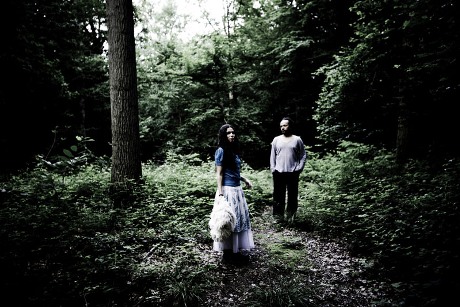
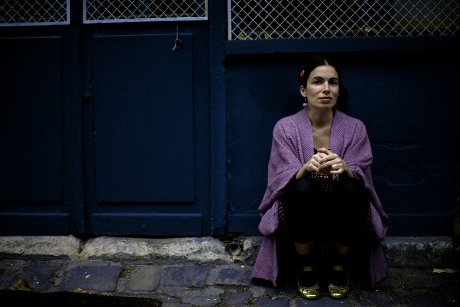
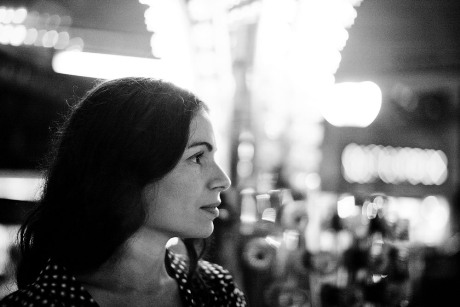

Comment (1):
Bellen und Miauen im Postbahnhof – und mittendrin ein Regenschirm, -irm, -irm «
[…] den zweiten Song des Abends: auf Yael Naims Version von Rihannas Umbrella. Schließlich hat sie im Klangverführer-Interview im April versprochen, ihn zu spielen. Ihr geniales Toxic noch im Hinterkopf, bin ich seitdem […]